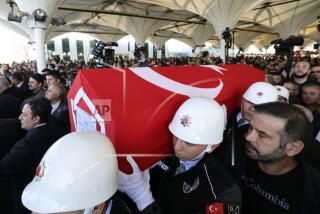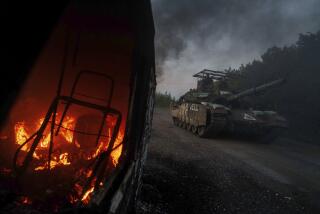Turkey Bombs Kurdish Rebels Inside Iraq
- Share via
WASHINGTON — Turkish military forces are using warplanes to attack Kurdish guerrillas in northern Iraq in a defiant offensive against Kurds who until now have been protected by a U.S.-led multinational force, American and Turkish officials said Wednesday.
At the same time, Turkey announced that it has moved troops and tanks across the border into Iraq to occupy a new buffer zone that the Ankara government described as a necessary defense against infiltration by Turkish Kurdish guerrillas.
The Turkish government said its raids were aimed only at Turkish Kurds who have used Iraqi territory as a haven to step up their insurgency against the Ankara government.
But an Iraqi opposition group reported from northern Iraq that the bombing raids killed innocent Iraqi Kurdish refugees in at least two villages there. A spokesman for the group urged the U.S.-led rapid deployment force to intercede to prevent the “atrocities” from recurring.
With that force now arrayed in southern Turkey and pledged to defend Kurdish refugees against reprisals by Iraq, the unexpected attack by Turkey adds a major complication to a U.S. policy that has looked to the Kurds as an important counterforce to Iraqi dictator Saddam Hussein.
In an indication of that awkwardness, the Bush Administration refrained from official comment on the Turkish raids, except to note that they took place well east of the security zone for which the U.S.-led force is responsible.
But Administration officials said privately that they were taken aback by the Turkish move. One source said that by launching the military raids, Turkey violated an informal agreement with the United States to limit its anti-guerrilla campaign in Iraq to small-scale reconnaissance patrols.
“Aerial bombardment was definitely not part of the deal,” one government source said.
American experts on the region said that the attacks by Turkey on the Kurds in Iraq, in apparent disregard for U.S. interests, is a sign of a further unraveling of the coalition assembled by the United States against Iraq during the Persian Gulf War.
“Our two so-called friends are at each other’s throats,” said Judith Kipper of the Brookings Institution, “and that distracts from the central task of putting pressure on the government of Iraq.”
The Bush Administration encouraged Iraqi Kurds to revolt against the Iraqi government in the waning days of the war in hopes that such an uprising could help overthrow Hussein. But government forces crushed the uprising in a crackdown that sent millions of Kurds fleeing from their homes.
Turkish troops then took part in the 3,300-member U.S.-led force that occupied a large swath of northern Iraq to provide aid and protection to the fleeing Kurds. But relations were sometimes strained between the Turkish soldiers and the Kurds, whom the Turks apparently suspected of supporting a violent campaign by a Kurdish guerrilla group in Turkey.
In choosing now to strike across its border, Turkey apparently was taking advantage of the void left when the multinational occupation force pulled out of Iraq last month, according to experts in and out of government.
Authoritative information about the location and extent of the raids remained scarce Wednesday night, and neither the Turkish government nor American officials would provide details. There was no immediate response from the government of Iraq.
But a spokesman for the Kurdish Democratic Party told Reuters news service by telephone from northern Iraq that in one incident Wednesday, Turkish warplanes attacked a Kurdish settlement in the village of Kherazook in the Sherwan district of northeastern Iraq, killing 11 refugees and wounding 13.
The spokesman said an earlier Turkish bombing raid Monday on the village of Khakork in the Sidakan district killed 18 Iraqi Kurds.
In using blunt language Wednesday to confirm that the raids were under way, Turkish officials adopted an unyielding posture on a military strike so sensitive that its first days were shrouded in secrecy.
Prime Minister Mesut Yilmaz emerged from a Cabinet meeting in Ankara to announce that the operation will “reach its objective in a short time.” But he added that the government will act “resolutely” “to keep this area clean,” the Associated Press reported.
Yilmaz sounded a stern warning in outlining the Turkish plan to use troops to occupy a 3-mile-deep buffer zone along the border in northern Iraq. “Everybody who steps into that area will be fired on,” he said in an interview with the Hurriyet newspaper.
The Turkish raids into Iraq come after several weeks of increasingly daring attacks in southern Turkey by guerrillas from the Kurdish Workers Party, who since the end of the Gulf War have set up camps in northern Iraq.
The rebels, whose organization is known by its Turkish initials PKK, killed nine Turkish soldiers and a village guard in a rocket attack on a border post near the town of Semdinli on Sunday. Days earlier, Kurdish guerrillas kidnaped 10 German tourists from a mountain campsite in Turkey.
The Administration official who said the United States had agreed informally that Turkish forces could conduct reconnaissance patrols across the border described the arrangement as the result of an American recognition of the problem that the rebel forces present to the Turkish government.
But the official stressed that the United States had neither condoned nor expected any such offensive military operation.
With the multinational force now having withdrawn from Iraq, protection for the Kurds is officially limited to a 100-mile-wide “security zone” from which the United States, Turkey and four other European allies have pledged to bar entry by Iraqi troops.
Day-to-day authority in the region lies in the hands of Iraqi Kurdish guerrillas, known as peshmergas , who have been negotiating with Baghdad since June for eventual autonomy. The peshmergas do not support the separate campaign for autonomy by the Turkish PKK, in which more than 3,200 people have been killed since 1984.
One government official familiar with the dispute described the PKK as a small but disciplined band of Marxists trained in the Syrian-controlled Bekaa Valley of Lebanon and directed by Kurdish leaders in Damascus. “We’d like the (Kurdish Workers Party) problem to go away,” the official said, suggesting that there is some sympathy with the U.S. government for Turkey’s actions.
More to Read
Sign up for Essential California
The most important California stories and recommendations in your inbox every morning.
You may occasionally receive promotional content from the Los Angeles Times.














